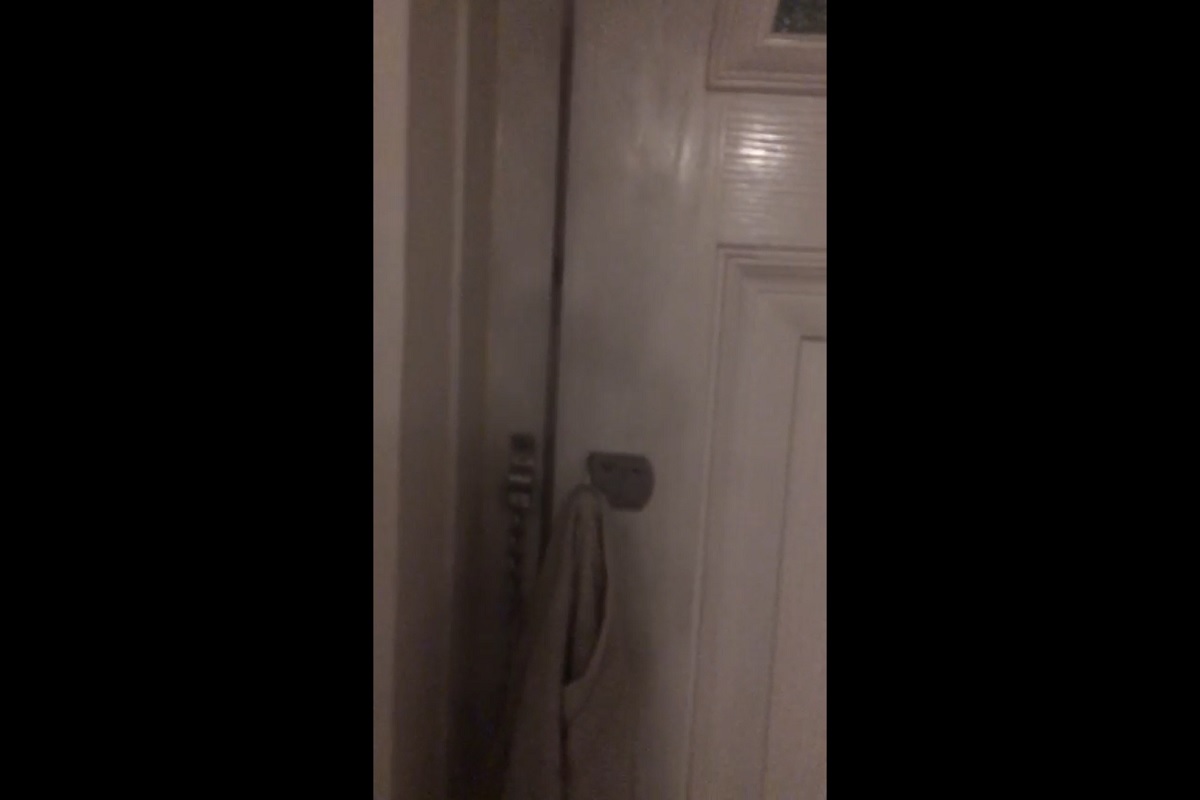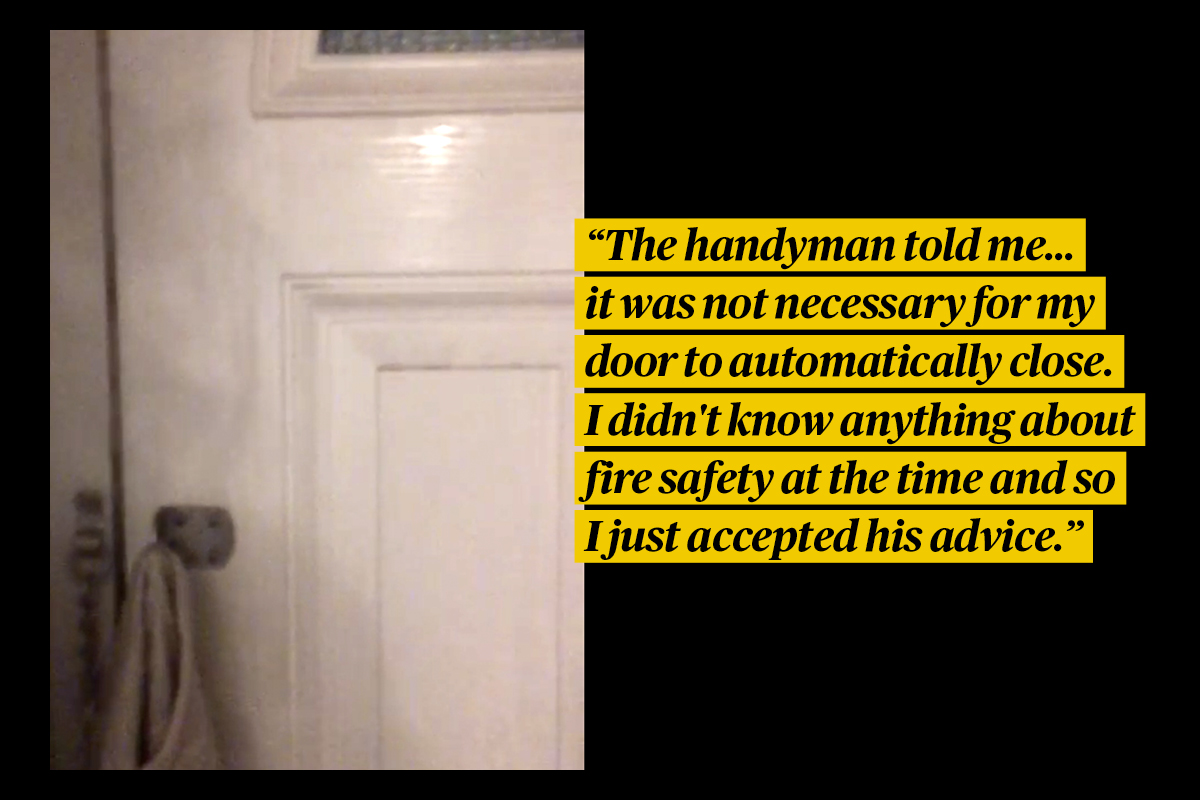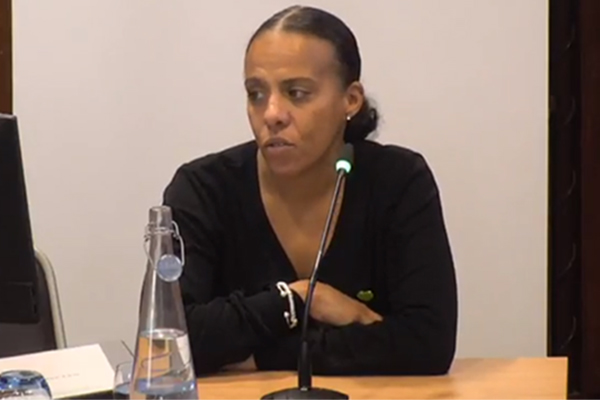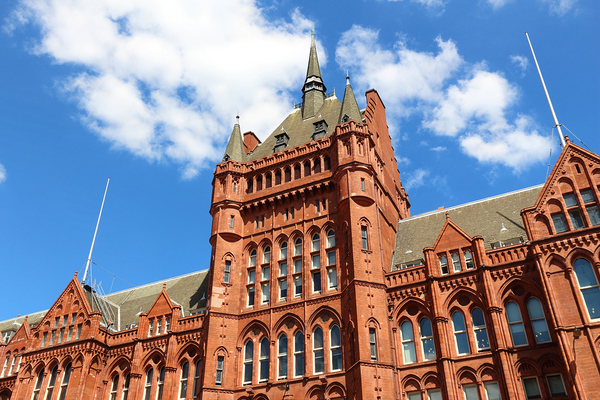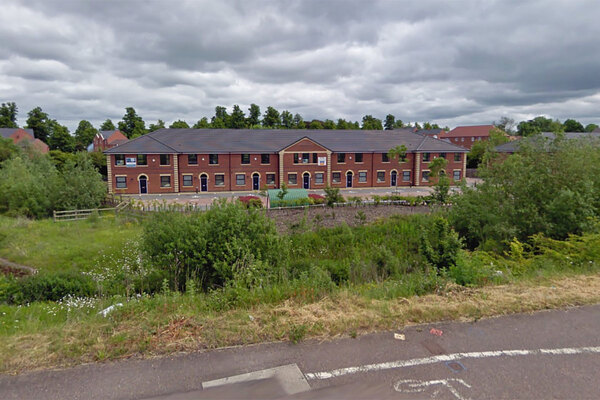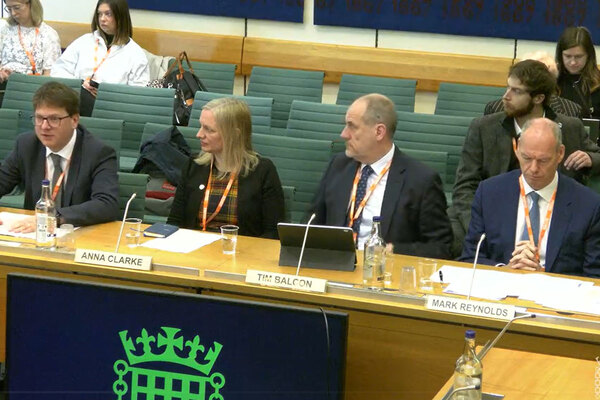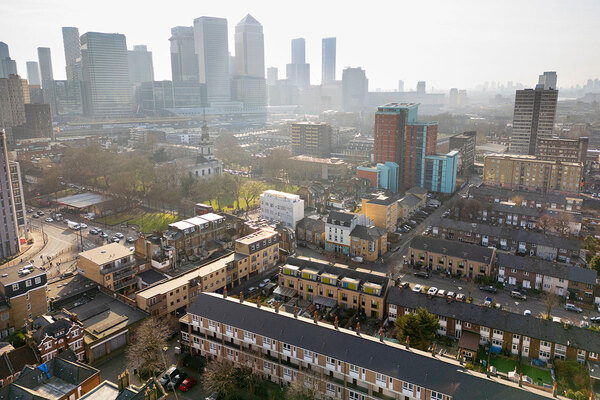Grenfell Inquiry day 69: video shows smoke billowing through fire door
A video played to the public inquiry into the Grenfell Tower fire has shown smoke billowing through a resident’s front door.
Key points
- Terrifying video shot by tenant on night of fire shows smoke pouring through gaps around front door
- Inquiry hears father of baby Logan describe 30-minute escape down 21 storeys
- Describes a litany of fire safety concerns before the fire that were ignored by landlord
Marcio Gomes, an IT manager who lived in flat 183 on the 21st floor of Grenfell Tower, shot the footage on his mobile phone on the night of the disaster.
He eventually escaped the fire along with his heavily pregnant wife Andreia Perestrelo and their two daughters, aged 10 and 12.
However, the couple’s unborn son, Logan, was stillborn in hospital less than 24 hours later as a result of smoke and cyanide inhalation while Ms Perestrelo was in an induced coma.
In written evidence to the inquiry, Mr Gomes said the “depth and pain of the loss of our unborn son cannot be conveyed by mere words”.
The family’s pet dog, Lili, also perished in the fire. One of Mr Gomes’ daughters had tried to carry her out but dropped her on the escape. The dog was later found dead on the landing outside the family’s flat.
Mr Gomes described the family’s “very happy” life before the fire and said Grenfell “was a lovely place to live”.
However, he listed a series of concerns with the refurbishment works to the tower – which were carried out by Rydon between 2012 and 2016.
He added that he “had several concerns about fire safety both before and after the refurbishment works”.
These included fears about “huge” gaps around the edges of windows in his flat, which he said were filled with mastic filler and chunks of foam.
And he described concerns about gas and non-gas pipes fitted as part of the refurbishment, as well as a dispute with Kensington and Chelsea Tenant Management Organisation’s (KCTMO) attempt to move the flat’s boiler to above the fuse box and a series of power surges in the tower.
Mr Gomes said that KCTMO responded to his concerns by saying he was “paranoid”.
He also described removing the automatic closer on the new flat front door fitted during the refurbishment because of concerns that it could injure his daughters by closing too quickly.
KCTMO subsequently inspected the flat “and never raised it as an issue”, he told the inquiry.
And he voiced doubts over the building’s smoke ventilation system, which he said he did not hear on the night of the fire or for several weeks beforehand – despite the fact that it would regularly activate without apparent reason.
He suggested that KCTMO had switched off the system because of complaints from residents.
On the night of the fire, Mr Gomes was woken by a neighbour at 1.30am.
After looking out of the window and seeing firefighters running into the building, he said his “instincts kicked in”, and he ran a bath and put wet towels by the doors.
However, a chilling video shown to the inquiry today shows smoke seeping steadily through the gaps around the handle side and bottom of the flat’s front door.
In the 30-second clip, Mr Gomes briefly opens the front door to reveal silence and pitch dark smoke outside which floods into the flat, causing him to cough.
“To be brutally honest, it was because I wanted my loved ones to see what the situation in the tower was like if I did not make it out,” he said in his statement.
He told the inquiry today that you “couldn’t see your hand in front of your face” through the smoke at that time, and that it stung his eyes and made it difficult to breathe.
Mr Gomes told the inquiry he had been running the shower in an attempt to get “wet particles” into the flat to combat the dryness of the smoke – but that the water supply soon cut off.
He described two aborted attempts to leave the flat and 999 calls in which he was told firefighters were coming to rescue his family and a neighbour and her daughter who were seeking refuge.
Eventually, at 3.09am, an emergency call handler told Mr Gomes: “The situation at the moment is there’s going to be some time before they get to you and the best advice we can give you is to make another attempt to leave if you can and get into the stairwell and down.”
Mr Gomes said he felt that previous advice from call handlers had been “misleading”.
“I wish that the operators had been honest and more knowledgeable about the situation from the first phone call as had I known that no help was coming, I would have handled the situation differently,” he said.
“If I knew that no help was coming, I would not have stayed in the burning tower with my family a minute longer.”
By this point, he said the ceiling in the flat was “now dark and full of smoke” and that he could see “red and yellow” near his bedroom window”.
While still on the phone to the fire brigade, he described seeing flames burst through the window and spread across the wall to the ceiling – “like something you see in films”.
At Mr Gomes’ request, the inquiry was played the recording of his final 999 call as the family made their way out of the tower.
“There is no way in which I can convey in words in a statement the abject fear and torment faced by those who got onto the stairwell at around 3:30am,” he explained.
“It is not easy in words to describe the physical and emotional stress and burden of trying to save your own life and the instinct to drive your children and family on so that you will all survive an inferno.”
He described his escape from the building which took half an hour, walking holding hands with his family through “unnatural and toxic” smoke.
So thick was the smoke, he said, that he could not see until sixth or seventh floor.
He described stepping and stumbling over the bodies of “friends and neighbours” on the way down. One person grabbed his calf.
And he described his terror after losing contact with his wife and daughters in the darkness after one said: “Daddy, I can’t go on anymore, I can’t.”
“I was calling out to them but could not hear any responses. I was totally beside myself with fear and hurt,” he recalled.
He said he believed the children had passed out about halfway down the tower, overcome by smoke and toxins.
Eventually firefighters found Ms Perestrelo and the couple’s daughters, who in fact escaped the tower before Mr Gomes.
Outside, Mr Gomes described seeing the “towering inferno” of Grenfell and being reunited with his family.
They were then taken in an ambulance to King’s College Hospital in south London, with Ms Perestrelo and the two girls put into an induced coma due to their “critical” condition.
Ms Perestrelo was given a 50-50 chance of survival due to cyanide poisoning.
Mr Gomes said he has been told his daughters had “medically unprecedented” levels of cyanide poisoning.
Describing the family’s psychological problems since the fire, Mr Gomes said: “I kept thinking of my son and how I had let down him and my family.”
He expressed “nothing but praise for the ordinary firefighters of the London Fire Brigade” – but criticised advice he was given on the phone.
He said: “Why could they have not rung me back and said to me that we were on our own and no one can get to us? We were given false information and false hope of rescue. That delayed us in leaving the tower.”
“The delay in telling us to evacuate nearly killed us, and it did kill my baby son. I have no doubt of that.”
He also touched on his experience of being rehoused after the fire, saying it was “disgusting” that Kensington and Chelsea “left me and failed me at my time of need”.
He said the council’s and KCTMO’s attitude towards the family “were inadequate and contemptuous”.
Ms Perestrelo had to arrange the family’s temporary accommodation herself after they were “pushed” by the council to leave emergency hotel accommodation.
They are now in a permanent home.
“It is not a case of blaming somebody or some organisation; it is a case of finding out what happened and why it was allowed to happen,” Mr Gomes said, concluding his written evidence.
“On that stairwell, that night, money and cost were not relevant. Families’, and in particular children’s, lives were being lost. I hope the inquiry forces the government to put human life at the top of the list, as the long-term costs of multiple injuries and death is beyond calculation.”
Mr Gomes was the last survivor to give evidence to phase one of the inquiry, which will resume on Monday with evidence from the Metropolitan Police, the London Ambulance Service, the council and KCTMO. The inquiry continues.
The Grenfell Tower Inquiry
Closing statements
Day 85: victims' lawyers attack the fire brigade
Further expert evidence
Including some additional evidence from emergency call handlers, bereaved and relatives
Day 84: further evidence from survivors and relatives
Day 83: swift evacuation of tower possible if residents alerted
Day 82: initial fire was extinguished but then returned to the flat
Day 81: overheating fridge-freezer most likely cause of fire
Day 80: fire doors installed did not match product tested
Day 79: resident advised to stay put despite fire in flat
Day 78: insulation and cladding material below required standard
Day 77: molten plastic spread blaze down tower
Day 76: 'stay put' should be dropped when fire spreads across floors
Other witness evidence
Police, ambulance, gas suppliers, council, TMO and call room operators give evidence
Day 75: call room operators give evidence
Day 74: further evidence from TMO officers
Day 73: TMO boss failed to pass information to firefighters
Day 72: fire finally extinguished when gas switched off
Day 71: further questions over stay put advice
Day 70: the police evidence
The bereaved, survivors and relatives’ evidence
Day 69: video shows smoke billowing through fire door
Day 68: KCTMO removed self closing mechanism and never replaced it
Day 67: gaps in cladding fixed with duct tape
Day 66: 'don't fix broken system with a sticking plaster'
Day 65: survivor dragged disabled man down nine floors to safety
Day 64: KCTMO 'did not replace broken fire door'
Day 63: foam insulation inside cladding 'exposed' says survivor
Day 62: father gives harrowing account of son's death
Day 61: council’s management organisation slammed for faulty electrics
Day 60: stay put advice ‘led to deaths’, residents say
Day 59: residents describe problems with new windows
Day 58: survivor describes how daughter saved his life
Day 57: firefighter evidence ‘a slap in the face’, says survivor
Day 56: relations with contractor were ‘toxic’
Day 55: resident 'never happy' with stay-put advice
Day 54: tenant gives evidence about housing association
Day 53: stay put advice 'felt like trap'
Day 52: resident saved by son's phone call
The firefighters’ evidence
Day 51: firefighter feared encouraging residents to jump
Day 50: the LFB commissioner
Day 49: fire chief reveals frustration over lack of building plans
Day 48: internal fire spread 'bigger story' than cladding
Day 47: fire officer considered evacuating crews over building collapse fears
Day 46: 'we were improvising' senior firefighter admits
Day 45: firefighter urged for abandonment of 'stay put' policy
Day 44: firefighter recalls radio signal difficulties
Day 43: call hander 'uncomfortable' with insisting residents stay put
Day 42: residents only told to leave if they called fire brigade back
Day 41: breathing equipment delay 'hampered rescues on upper floors'
Day 40: chiefs told firefighters to abandon policy
Day 39: firefighters reveal dramatic rescue of children
Day 38: firefighters issue aplogies to families
Day 37: council 'unable to provide tower plans'
Day 36: QC defends inquiry process
Day 35: Javid would welcome interim recommendations
Day 34: water from hose 'too weak' to reach the flames
Day 33: 'oh my god, we've been telling people to stay put'
Day 32: further fire fighter describes lack of equipment and low water pressure
Day 31: 'incredibly difficult' task of recording information outlined
Day 30: struggle to maintain control over rescue operation described
Day 29: fire service 'overwhelmed' by survival guidance calls
Day 28: 'the building beat us'
Day 27: firefighters 'forced to abandon plans to reach roof'
Day 26: poor signage hindered rescue efforts
Day 25: water pressure left firefighting equipment 'like garden hose'
Day 24: decision to abandon 'stay put' explored
Day 23: TV images 'could have assissted' rescue effort
Day 22: description of hectic scenes in the control centre
Day 21: account from the fire service 'nerve centre'
Day 20: firefighter describes 'huge volume' of calls from trapped residents
Day 19: firefighter 'given no training on cladding fires'
Day 18: evacuation would have been 'huge catastrophe'
Day 17: firefighters describe access and lift issues
Day 16: scenes of carnage likened to 9/11
Day 15: firefighters recount trauma of survival guidance calls
Day 14: firefighters describe spread of blaze
Day 13: firefighters recall radio difficulties
Day 12: "it was like a war zone"
Day 11: questions raised over fire fighters' radios
Day 10: watch manager emotional under questioning
Day nine: lead firefighter 'not trained in stay put policy'
The expert reports: authors give evidence to inquiry
Day eight: where the fire started
Day seven: what was in the cladding?
Day six: the cause and spread of the fire
Day five: expert highlights key issues
Day four: firefighters defend response to fire
Day three: council and contractors appear for the first time
Day two: lawyers for the survivors make their case
Day one: expert evidence released on cladding and stay put
The commemoration hearings
30 May: Grenfell Council 'recognised it should not house disabled victim above four storeys'
29 May: Anger on day six of the Grenfell Inquiry
25 May: Grenfell families 'forced to live in chimney with stay put policy'
24 May: Grenfell family complained about father being housed on 17th floor
23 May: Tributes to children on third day of Grenfell hearings
22 May: Emotions run high as Grenfell bereaved shown footage of the tower burning
21 May: Grenfell victims share tributes as inquiry opens
